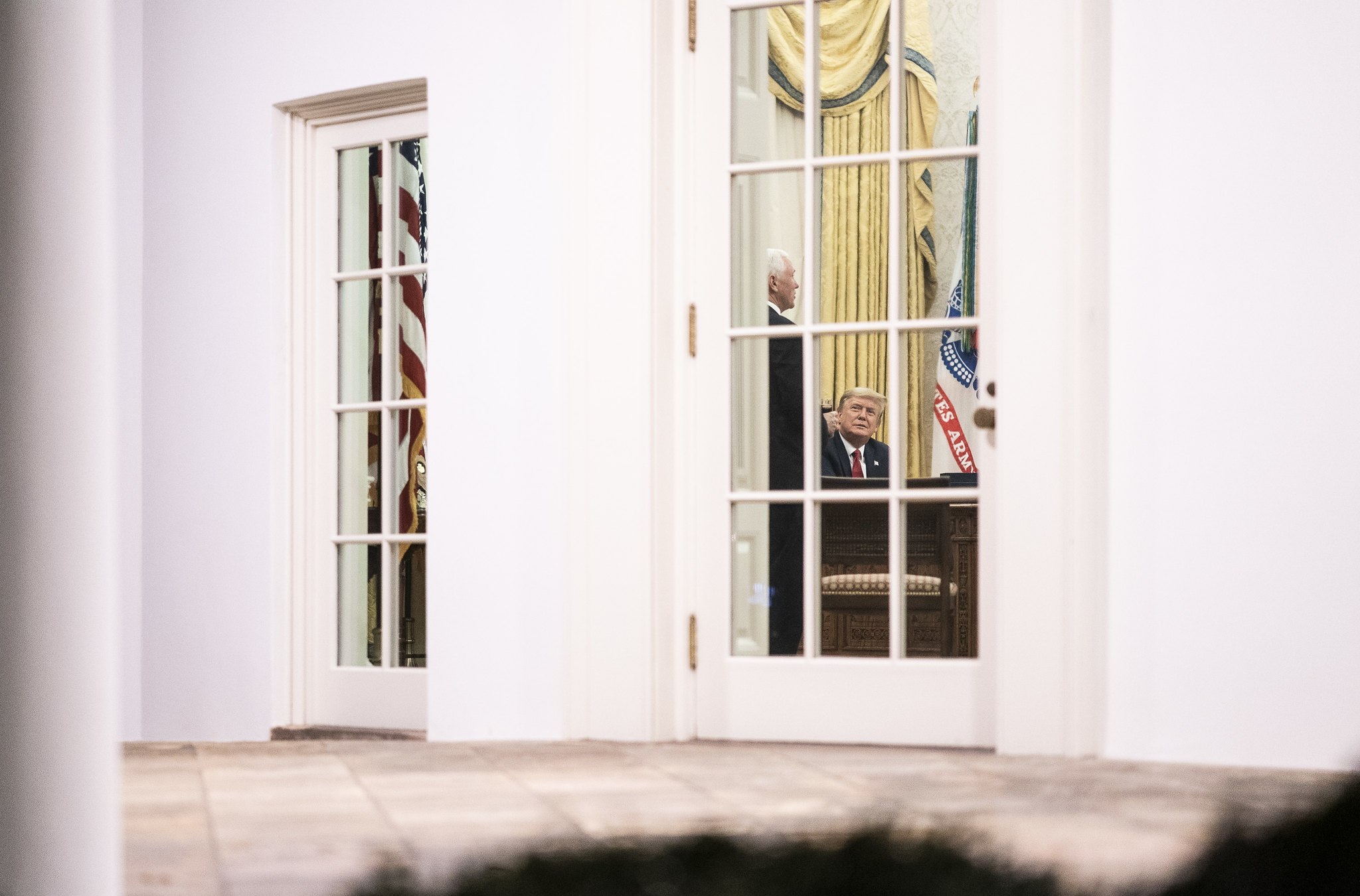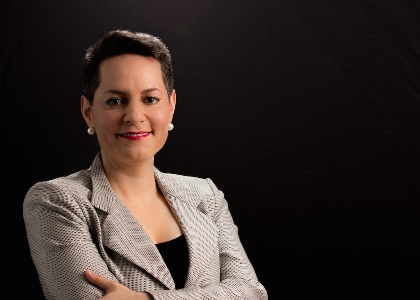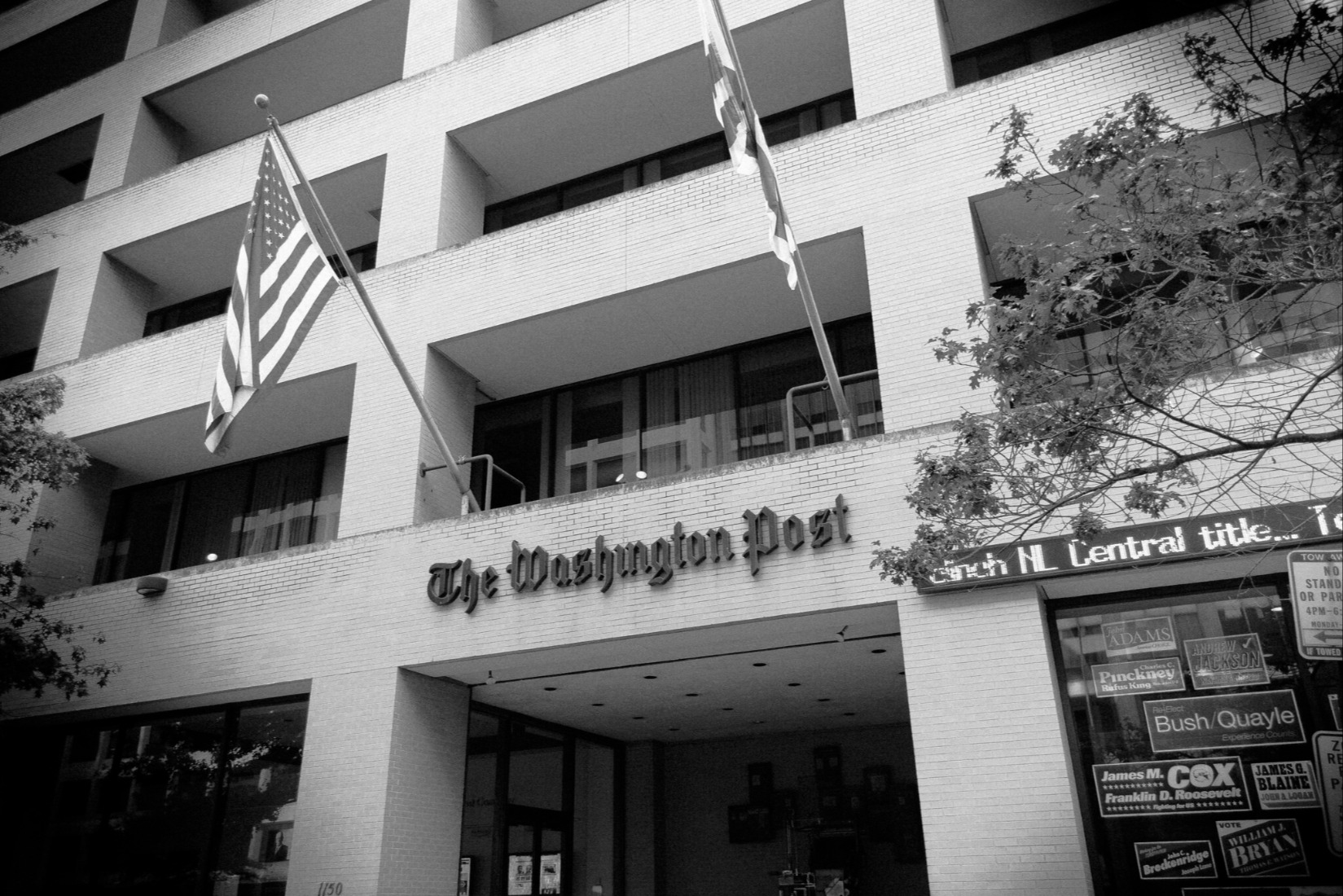Now Will the Justice Department Investigate Trump?
The Jan. 6 Committee filed a brief in federal court asserting that evidence "establishes a good-faith belief that [former President] Trump and others may have engaged in criminal and/or fraudulent acts.”

Published by The Lawfare Institute
in Cooperation With

On the evening of March 2, the House Select Committee to Investigate the Jan. 6 Attack on the Capitol filed a brief in federal court in Santa Ana, Calif. asserting that “evidence and information available to the Committee establishes a good-faith belief that [former President] Trump and others may have engaged in criminal and/or fraudulent acts.”
Specifically, it outlined evidence suggesting that Trump had committed two crimes: corruptly obstructing an official proceeding (18 U.S.C. §1512(c)(2)) and conspiracy to defraud the United States (18 U.S.C. §371). With respect to both statutes, the committee focused on Trump’s attempts to intimidate and cajole Vice President Mike Pence into violating the Twelfth Amendment and the Electoral Count Act by refusing to count states’ already certified votes. The brief cites Trump’s “extensive public and private campaign to convince the Vice President to reject certain Biden electors or delay the proceedings, without basis,” and also mentions his “disseminating false information about election fraud, and pressuring state officials to alter state election results and federal officials to assist in that effort.”
The filing has Democrats pushing Attorney General Merrick Garland to commence an investigation—assuming that he hasn’t already secretly started one. As Politico reports:
Rep. Adam Schiff (D-Calif.), a member of the select panel, said he’s concerned that DOJ has not yet taken potential crimes by Trump and his network seriously enough. The lack of overt signs that Trump is being investigated suggests that the department has not yet moved, he observed.
“If the Justice Department believes there is evidence of a crime involving anyone, including the former president, they should be investigating it,” Schiff said.
. . .
“Criminal prosecutions are appropriate. No question,” said Rep. David Cicilline (D-R.I.), who served as a manager during Trump’s second impeachment trial for the Jan. 6 insurrection, though he emphasized the independence of the department.
Although the committee’s filing appends 18 exhibits that do not appear previously to have been public—including four emails from Trump’s outside advisor John Eastman and excerpts from 10 interviews among the more than 500 it says it has conducted— the gist of the information revealed has, for the most part, already been reported. And the committee’s theories of criminal conduct very closely track those argued by Barbara McQuade, a former U.S. Attorney for the Eastern District of Michigan and Michigan Law School professor, in a “model prosecution memo” she published in Just Security last month. McQuade, too, focused on Trump’s attempts to intimidate Pence into refusing to count properly certified Electoral College count votes, which she saw as constituting violations of the same two statutes.
Still, McQuade was relying solely on public information—mainly journalism—while the select committee is relying on a mountain of non-public testimony and documentary evidence gleaned over nine months in one of the most intensive congressional investigations in history.
So could this filing push the Justice Department to commence a criminal inquiry of Trump—if it isn’t already pursuing one? To examine that question, we will outline what the filing means and doesn’t mean, and what it contributes that we didn’t know before.
The context for the filing is a suit filed by Eastman in January in the Central District of California (in the Santa Ana courthouse) attempting to evade production of about 11,000 emails that the committee has subpoenaed from him. Eastman has asserted attorney-client and attorney work-product privileges over those emails, on the theory that he had been acting as a lawyer for Trump in connection with election issues since September 2020. Acting in that capacity, Eastman had pushed a legal theory under which Pence could upend the certification of the electoral vote and hand the 2020 election to Trump.
In an attempt to defeat Eastman’s claims, the committee yesterday outlined several arguments for why the documents are not shielded by that privilege, including the so-called “crime-fraud” exception. Since the committee also advanced other bases for overcoming Eastman’s privilege claims, it’s at least conceivable that U.S. District Judge David O. Carter might resolve this matter without even reaching the crime-fraud question. Carter has referred the dispute to Magistrate Judge Douglas F. McCormick to decide in the first instance.
The precise contours of the crime-fraud exception vary slightly from state to state, though the distinctions don’t really matter for the purposes of this article. Communications in which a “client consults an attorney for advice that will serve him in the commission of a fraud or crime” are not privileged, according to the committee’s brief (which cites controlling precedent in the U.S. Court of Appeals for the Ninth Circuit, which includes California). The crime-fraud exception applies when (1) “the client was engaged in or planning a criminal or fraudulent scheme when it sought the advice of counsel to further the scheme,” and (2) “ the attorney-client communications for which production is sought are ‘sufficiently related to’ and were made ‘in furtherance of [the] intended, or present, continuing illegality.’”
At this stage, the committee is trying to persuade Magistrate Judge McCormick to perform an in camera review of the emails Eastman is withholding to see if they are subject to the crime fraud exception. To do that, the committee only needs to show “a factual basis adequate to support a good faith belief by a reasonable person that in camera review . . . may reveal evidence to establish the claim that the crime-fraud exception applies.”
That might sound like a low bar—far below the proof beyond a reasonable doubt that the Justice Department would eventually need to prove guilt. And it is lower. But it’s not lower than the level of suspicion the Justice Department ordinarily requires before it will begin an investigation.
As set forth in the Attorney’s General’s Guidelines for Domestic FBI Operations, the internal rules governing FBI investigative activity, what is called “predication” is required for the FBI to begin an investigation. That means that the FBI must have a factual basis to believe that a crime has occurred, is currently underway, or will take place in the future. While the guidelines discuss various levels or kinds of investigations (ranging from low-level “assessments” to high-level “full investigations''), even full investigations have a low bar, only requiring “an articulable factual basis for the investigation that reasonably indicates” a crime has occurred, or will or may occur. A grand jury’s right to begin an inquiry is even lower still: the grand jury “may investigate merely on the suspicion that the law is being violated, or even just because it wants assurance that it is not,” the Supreme Court has noted.
In other words, it is probably impossible for the committee to be correct in its brief to the court and for there not also to be an adequate criminal predicate for the FBI to open an investigation of the matter. This, of course, does not mean that the committee is correct in its argument to the court, nor that the FBI or the Justice Department is obligated to open a criminal investigation just because a fact pattern meets the standard of predication. But the committee was surely aware when it advised a federal court that it had evidence of a crime adequate trigger the crime-fraud exception to the privilege—some of which evidence it provided and some of which it seeks to provide in camera—that it was necessarily, if indirectly, advising the Justice Department and the FBI that there is a predicate for a criminal investigation of the former president.
So what then, exactly, is the committee alleging?
The Committee’s Theories of Trump’s Criminality
For its purposes here, the committee argues that the evidence shows that Trump likely violated two federal criminal statutes. Given the context, however—attempting to gain access to Eastman’s emails—it would be a mistake to assume that these are the only crimes the committee suspects Trump of having committed. Rather, we can assume that these are the only potential crimes the committee suspects him of committing that are relevant to this case—in other words, that were arguably being furthered by Trump’s communications with Eastman.
The first crime alleged is corruptly obstructing an official proceeding—to wit, the Jan. 6 joint session of Congress—in violation of 18 U.S.C. §1512(c)(2). The gist of the committee’s argument runs as follows:
The evidence supports an inference that President Trump and members of his campaign knew he had not won enough legitimate state electoral votes to be declared the winner of the 2020 Presidential election during the January 6 Joint Session of Congress, but the President nevertheless sought to use the Vice President to manipulate the results in his favor. . . . the President and [Eastman] engaged in an extensive public and private campaign to convince the Vice President to reject certain Biden electors or delay the proceedings, without basis, so that the President and his associates would have additional time to manipulate the results. Had this effort succeeded, the electoral count would have been obstructed, impeded, influenced, and (at the very least) delayed, all without any genuine legal justification and based on the false pretense that the election had been stolen. There is no genuine question that the President and Plaintiff attempted to accomplish this specific illegal result.
Corruptly obstructing an official proceeding is the most common felony charge leveled against Jan. 6 Capitol riot criminal defendants to date. Among the 750 people charged federally in connection with the insurrection, more than 275—or almost 40 percent—have been charged with violating this offense, which carries a 20-year maximum term. At least eight district judges have generally upheld its use in this context, including at least six in written rulings. (For more on that statute’s use in Capitol riot cases, see here.)
Nevertheless, none of those cases resembles the one the committee is suggesting could be brought against Trump. Trump did not penetrate the Capitol and did not participate in any violence. Nor does the committee, in its brief, allege that he instigated a riot or insurrection. It does, however, note in passing that U.S. District Judge Amit Mehta recently, in a civil context, denied motions to dismiss in cases against Trump alleging that he instigated an insurrection creating liability under 42 U.S.C. Section 1985(1).
So the challenging element to prove in a mounting such a case against Trump will be that he “corruptly” obstructed the congressional proceeding. Judges have ruled that “corruptly” requires that the defendant know he’s acting wrongfully. That has been easier to prove in other Capitol riot cases, where defendants were often simultaneously committing multiple other crimes. Here, however, it’s unclear whether judges or juries would find that pursuing bad-faith legal theories rises to the level of the evil state of mind required.
On this point, however, the committee has an interesting argument. The committee claims that the legal theory being advanced was unambiguously wrong and that both Eastman and Trump had to have known it:
Nothing in the Twelfth Amendment or the Electoral Count Act provides a basis for the presiding officer of the Senate to unilaterally refuse to count electoral votes—for any reason. Any such effort by the presiding officer would violate the law. This is exactly what the Vice President’s counsel explained at length to Plaintiff and President Trump before January
The last reference is to testimony Pence counsel Greg Jacobs gave in a deposition before the committee last month in which he said, “[Eastman] had acknowledged that he would lose 9-0 at the Supreme Court.”
The Committee’s evidence of “corrupt” intent also appears to rely upon Trump’s relentless reliance on disproven claims of election fraud:The evidence supports an inference that President Trump and members of his campaign knew he had not won enough legitimate state electoral votes to be declared the winner of the 2020 Presidential election during the January 6 Joint Session of Congress, but the President nevertheless sought to use the Vice President to manipulate the results in his favor. By December 14, 2020, the Electoral College had voted to send 306 certified electoral votes for Biden and 232 certified electoral votes for Trump. No state legislature had certified an alternate slate between that time and January 6, 2021. Moreover, no court had endorsed the Trump campaign’s numerous attempts to challenge state election results in the wake of the election. Thus, even if the Vice President had authority to reject certified electoral certificates (and he did not), there was no valid lawful basis to do so.
Interestingly with respect to its “corruptly obstructing” allegation, the committee’s brief suggests only that Trump committed the substantive offense, not that he “conspired” to commit that offense. This is an interesting omission which reflects the committee’s apparent conclusion that a conspiracy allegation is actually not essential. Trump had direct conversations with Pence, after all, in which he tried to convince him not to count electoral votes from the swing states. That is a pretty direct act to obstruct the relevant proceeding.
At the same time, the Justice Department might well think about these acts in the language of conspiracy law. The committee’s brief often alleges that Trump committed the obstruction offense with the help of others, including Eastman. If prosecutors ever chose to charge the group activity, they might well cast the offense as a conspiracy, treating the obstruction of the proceeding as the predicate offense of the conspiracy. That would be simple for them to do so. The same section of the criminal code contains a conspiracy section (18 U.S.C. §1512(k)) which, like the substantive offense, carries a 20-year maximum sentence.)
Conspiracy to Defraud the United States
The other statute the committee alleges that Trump violated is the general federal conspiracy statute, 18 U.S.C. §371, which carries a five-year maximum sentence. Though prosecutors most commonly use this law in conjunction with another federal criminal statute—as when they, for instance, charge conspiracy to commit wire fraud—they can also use it alone whenever “two or more persons conspire . . . to defraud the United States . . . in any manner or for any purpose, and [whenever] one or more of such persons do any act to effect the object of the conspiracy.”
Here, the committee deploys this second sense of the statute. Unlike most frauds, a “fraud against the United States” under this statute need not allege that the government was deprived of money or property. One defrauds the government, in this sense, if one “interfere[s] with or obstruct[s] one of its lawful governmental functions by deceit, craft or trickery, or at least by means that are dishonest,” the committee’s brief claims, citing Supreme Court precedent.
The committee’s defrauding-the-United-States allegation relies on many of the same facts as its “corruptly obstructing an official proceeding” theory:
The evidence supports an inference that President Trump, [Eastman], and several others entered into an agreement to defraud the United States by interfering with the election certification process, disseminating false information about election fraud, and pressuring state officials to alter state election results and federal officials to assist in that effort. As noted above, in particular, the President and [Eastman] worked jointly to attempt to persuade the Vice President to use his position on January 6, 2021, to reject certified electoral slates submitted by certain States and/or to delay the proceedings by sending the count back to the States.. . . . [Eastman] first crafted a “plan” to justify this course of action. [Eastman] and the President then met and spoke with the Vice President and members of his staff on several occasions on January 4-6 in an attempt to execute Plaintiff’s plan. Plaintiff continued these efforts to persuade the Vice President via ongoing conversations with the Vice President’s staff, and the President employed numerous public statements to exert additional pressure on Pence. The evidence developed to date indicates that these actions were all part of a concerted effort to achieve a common goal: to prevent or delay the certification of the 2020 presidential election results.
Will the Select Committee’s Filing Change the Department of Justice’s Perspective?
So will the committee’s brief actually trigger a Justice Department investigation? The answer to that question is not entirely clear. To be sure, the committee’s opinion has unparalleled weight. McQuade has tremendous credibility as an outside observer writing in a serious publication, and as we noted above, the allegations from the committee are similar to the ones she made. But the House Select Committee is the definitive legislative authority on this subject, and unlike McQuade, it is making these allegations after having interviewed more than 500 witnesses and collected 63,000 documents. What’s more, the evidence it is putting forward, it claims, is only a fraction of the relevant material it has collected, and it has already submitted additional exhibits under seal, according to the court record. While the committee has not made a formal criminal referral, one would expect that when a serious, bipartisan congressional investigation represents to a federal court that it has a pile of non-public evidence adequate to overcome a claim of attorney-client privilege because of the crime-fraud exception, the FBI’s ears prick up.
Politically, the filing is already adding urgency to the chorus of voices wondering: Where’s Merrick Garland? That will surely continue.
Of course, the answer to that question—as we’ve dutifully and repeatedly noted–might be that the Justice Department or FBI is already quietly investigating these charges (or similar ones) and never needed any prodding from anyone.
If that’s the case, then the department is certainly showing extraordinary—even admirable—stealth. At a minimum, we can say with confidence that an investigation, if it has been opened, has not taken the kind of overt investigative steps that make news. The press is aware of no witnesses or documents that have been subpoenaed nor of any search warrants that have been executed. If such an investigation exists, it remains at a relatively preliminary stage.
There are, in our view, more likely possibilities. Perhaps the most likely is that the Justice Department and FBI have long been aware of the legal arguments the committee is making and the gist of the factual allegations that the committee martialed in this brief, and has simply decided to hold off commencing a criminal probe for discretionary reasons. Another possibility, more remote, is that the department has studied the legal argument the committee is making and has, for some reason, concluded as a matter of law that it would or could never bring a such a case—and thus that it should not conduct a criminal investigation of a former president based on this theory. Such a posture would, in our view, require an explanation.
Even if the Justice Department has already considered the matter and decided not to open a case, though, the steady drip, drip, drip of incriminating evidence and authoritative voices demanding action could eventually change the bureau’s calculus.
Eventually, it either has to look at this matter or explain why it is not doing so.








